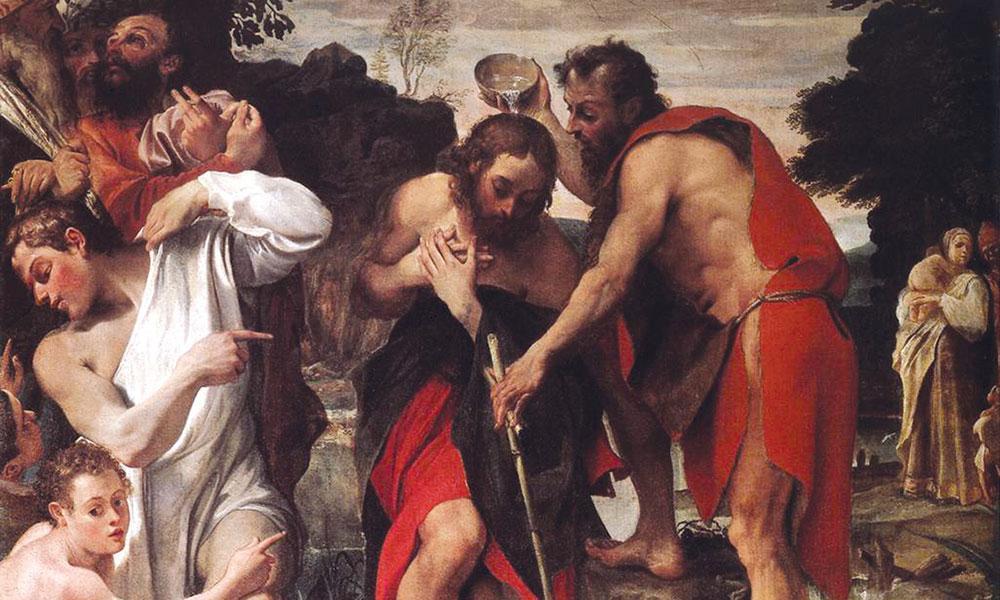
Encountering Jesus in Baptism
An authentic encounter with Christ presupposes faith in him first. The sacraments of the Church presuppose faith, even as they also nourish it. This faith, of course, is grounded in the authority of Christ. It is a faith that is only possible with the community of believers that is the Church, as it is “only within the faith of the Church that each of the faithful can believe.” (CCC 1253)
The sacrament of faith
This reality is perhaps most apparent in the sacrament of baptism. A catechumen (a person of at least seven years of age who is asking for baptism) or a godparent (a person who actually speaks for an infant or small child asking for baptism) is asked during the celebration of the sacrament: “What do you ask of God’s Church?” The proper response to this question is simply: “Faith!”
But let’s remember that the faith required for baptism is not perfect and mature. On the contrary, it is only a beginning of a life of faith that is then called to develop. The preparation for baptism seeks only to lead us to the threshold of new life. And, yes, baptism is the source of this new life in Christ “from which the entire Christian life springs forth.” However, as the catechism states, “for all the baptized, children or adults, faith must grow after Baptism.” Still, in this initial act of faith, the path is cleared for us to have an encounter with Christ through the sacrament.
Two keys to encounter
An encounter with another person is diminished by division. Whether the walls are real or constructed by presuppositions, prejudices, or hurtful words and actions, those walls prevent us from “seeing” the other and, therefore, encountering them. In our relationship with Christ, sin has the same effect.
Through baptism, however, all sins and all punishment for sins are forgiven. The waters of baptism wash away all that separates us from communion with Christ and, therefore, the Holy Trinity. We are then made into an altogether “new creature,” who is capable of believing in, hoping in and loving God, acting under the promptings of the Holy Spirit and growing in goodness. Baptism then breaks down the walls of separation that sin has constructed and makes an encounter with Christ possible. In fact, baptism goes so far as to make us an adopted daughter or son of God, a “partaker of the divine nature,” a co-heir with Christ, and a temple of the Holy Spirit.
Another key to encountering the other is to be where the other is. If we want to encounter someone, our chances are greatly enhanced if we seek out those places where the person is often to be found. The same would seem to hold true for the encounter with Christ. By incorporating us into the body of Christ, the sacrament of baptism greatly increases the number of our opportunities to encounter him. For Christ is present in his Church: in his word; in prayer; in the poor, the sick and the imprisoned; in the sacrifice of the Mass; in the person of the minister; and in all his sacraments.
Walk a mile
The admonition to walk a mile in another’s shoes before judging or criticizing expresses another key to encounter. Walking a mile in another’s shoes allows us to get into the mind of another – to gain insight to the other’s experiences, challenges, perspectives; and to see through his or her eyes. It is a type of encounter that can be powerful because it is an intimate encounter through communion with and participation in the experience, mind, love and thought of another.
In the same way, the sacrament of baptism invites us into the “shoes” of Christ; into an intimate communion and encounter with him. Jesus began his public life with his baptism by John the Baptist in the Jordan River. He did this not because he needed to be cleansed from sin, but to “fulfill all righteousness.” (Mt 3:15) At Jesus’ baptism, the Holy Spirit descended on him as a prelude of the new creation (just as it had hovered over the waters of the first creation), and the Father revealed Jesus as his “beloved Son.” Through our baptism, we participate in the baptism of Christ. As in the case of Jesus, the Spirit descends upon us making us a new creation, and the Father reveals us to be his beloved adopted sons and daughters.
What’s more, our baptism allows us to participate in the public life of Christ through our corporal and spiritual works of mercy as members of his body, the Church. Baptism also enables us to participate in the mission he gave to his Church: “Go therefore and make disciples of all nations, baptizing them in the name of the Father and of the Son and of the Holy Spirit, teaching them to observe all that I have commanded you.” (Mt 28:19-20)



